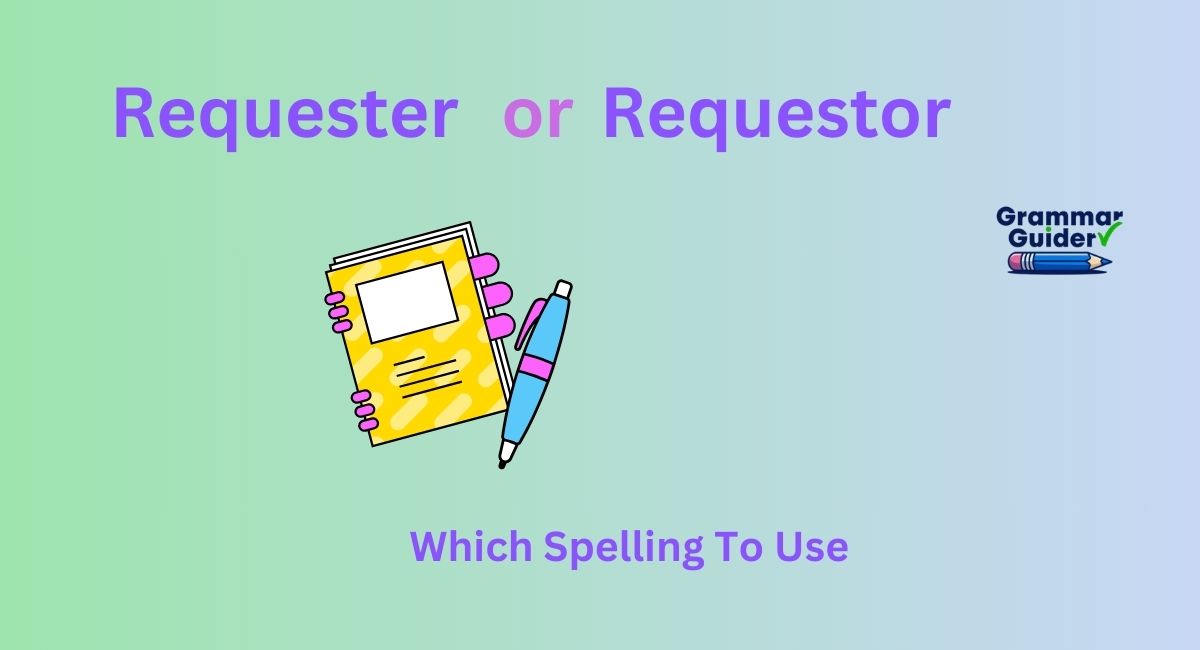When you write you may wonder about the words “requester” and “requestor.” Both words mean the same thing. They describe a person who makes a request. However “requester” is the more common spelling.
You can use it in everyday conversations business emails and legal documents without any problems.
On the other hand “requestor” is less common. You might see it in specific fields like computer programming or law. Some people think it sounds a bit more formal.
When you are unsure which word to use “requester” is usually the best choice. It is clear and widely accepted in both American and British English.
What do “Requester” and “Requestor” Mean?
“Requester” and “requestor” both mean the same thing. They refer to a person who makes a request. You can think of a requester as someone asking for something they need. This could be asking for information or help. These words are useful in many situations such as in conversations emails, or official documents.
Differences in Usage
While both words have the same meaning, “requester” is more common. You will see it used in everyday language. In contrast, “requestor” is less frequent.
You might find it in technical or legal fields. Some people use it because they think it sounds more formal. When in doubt use “requester.” It is the safer choice.
“Requester” vs “Requester”

“Requester”
- “Requester” is the more common spelling in everyday language.
- It is widely used in business and casual conversations.
- This word is friendly and easy to understand.
- “Requester” is the preferred choice for many writers.
“Requestor”
- “Requestor” is less common than “requester.”
- It is often used in specific fields, like law or technology.
- Some believe “requestor” sounds more formal or specialized.
- If unsure, it’s best to stick with “requester” for clarity.
Choosing the Right Term
- Use “requester” in everyday situations.
- “Requester” is a common choice in both American and British English.
- Pick “requestor” in special areas like law or technology.
- “Requestor” may look more formal in certain writings.
- When unsure, “requester” is a safe and clear choice.
| Aspect | Requester | Requestor |
|---|---|---|
| Definition | Someone who makes a request | Someone who makes a request |
| Common Usage | More common in general usage | Less common overall |
| Language Preference | Preferred in both American and British English | Less frequent; used in specific contexts |
| Contexts | Everyday communication, business, legal documents | Technical fields (e.g., programming), specialized legal contexts |
| Perceived Formality | Neutral, suitable for most situations | Slightly more formal or specialized |
| Versatility | Can be used in any context | Context-specific; sometimes chosen for style |
| Safe Bet | Yes, a reliable choice | Context-dependent; not as widely recognized |
Origins of the Word “Requester and Requestor”
The words “Requester” and “Requestor” come from the Latin root “requaerere,” which means “to ask or seek.” Over time, this root word evolved, first appearing in Old French as “requeste.” English adopted it and added the “-er” suffix, creating the word “Requester,” which refers to someone who makes a request.
Similarly, “Requestor” also comes from “requaerere.” However it kept the Latin suffix “or,” which can also mean someone performing an action. Though both “Requester” and “Requestor” share the same origin and meaning, “Requestor” is now used more often in specific fields like technology or legal documents where its more formal tone might fit better.
Examples in Context

The word “Requester” is common in everyday communication and business settings. For example “The requester of the report thanked us.” Meanwhile “Requestor” often appears in technical fields or legal documents, like “The requestor must submit all required information.” Both terms mean the same but suit different contexts.
Requester
A requester is a person who makes a request. This word is used often in both American and British English. The term is popular in business and legal documents. It is a safe choice for any situation or context.
Requestor
A requestor is someone who makes a request, too. This word is less common than requester. You might see it in special fields like technical or legal areas. It can sound more formal, but it means the same thing.
Synonyms of the Word “Requester”
- Applicant: A person who applies for something.
- Petitioner: Someone who asks for something formally.
- Seeker: A person who looks for something.
- Inquirer: Someone who asks questions.
- Claimant: A person who claims something, like a right.
- Candidator: Someone who offers themselves for a position.
- Proposer: A person who suggests an idea or plan.
- Solicitor: Someone who asks for something, often in business.
- Pleader: A person who makes a plea or request.
- Claimer: Someone who asserts a right to something.
FAQ’S
What is the main difference between “requester” and “requestor”?
The main difference is in usage. “Requester” is more common in general writing. “Requestor” is used in special fields like law or tech.
Which spelling should I use in my writing?
You should use “requester” for most writing. It is clear and widely understood. Save requestor” for specific technical contexts.
Is “requestor” a correct word?
Yes, requestor” is correct but less popular. It works well in certain fields. Use it when you need a specific term.
When is “requester” the best choice?
Use requester in everyday situations. It fits formal and informal writing. This spelling is the safest option.
Do people understand both spellings?
Yes most people know both spellings. However requester is more familiar to everyone. It is the best choice for clear communication.
Final Thoughts
Choosing between “requester” and “requestor” can be easy. Most people use “requester” because it is more common. It works well in many situations like school or work. This spelling is safe and accepted in both American and British English. You can use it in everyday talk or formal writing.
Requestor is also correct but is used less often. It may appear in special fields, like technology or law. Some people use it for style. If you are unsure stick with “requester.”
This choice will help you sound clear and correct in your writing. Understanding these differences makes you a better writer. You can use the right word confidently in all your requests.
Read More Blocks:

Harley Rose is a seasoned expert in English grammar and writing tips, blending years of knowledge and a love for language into her work. With a sharp eye for detail and a talent for making grammar accessible, Harley shares practical insights that help readers write with precision and flair. Her content is ideal for anyone looking to strengthen their writing skills and express themselves with confidence.

